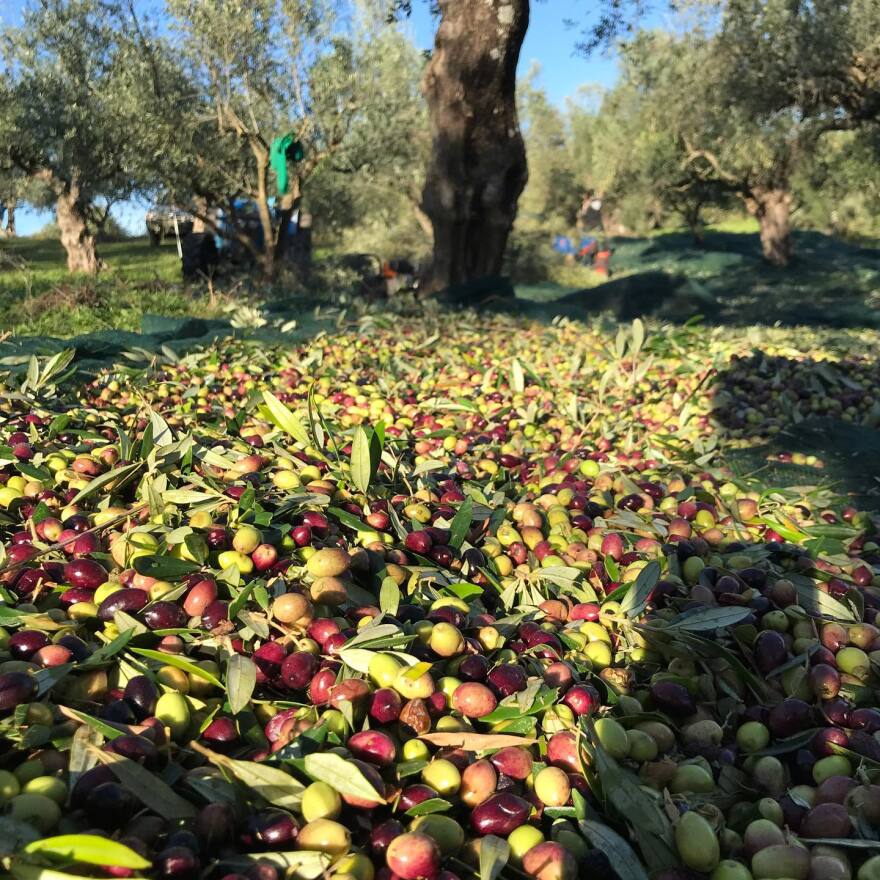I found an amazing source for dried figs and olive at our local farmers' market. Maria Lemanis grew up on Cape Cod. But her extended family is from Greece, and once she finished school she moved back to the old country to work on her family’s farm.
“Our prominent thing like what is the olives and figs and in general the region we’re in, Kalamata, there’s a lot of olives and figs,” Maria said.

You’ve probably heard of Kalamata olives—they’re large and brown or almost purple and in the U.S. you often see them on Greek salads. Maria’s family has been farming in the Kalamata region on the Peloponnese peninsula in southern Greece for centuries.
“I actually asked my grandfather recently and I was like well what did your father do,” she said. “They were farmers, what about before—we were always farmers so that’s what everyone does in the region there we’re all farmers and we’re all olive farmers basically.”
When Maria moved back to Greece, she got married and she and her husband became olive farmers too. But in 2009 when the Greek debt crisis hit, it was hard to make ends meet. So Maria and George came back to Cape Cod for the summer with a plan to sell their family’s olive harvest at Greek festivals.
“But apparently Greek people don’t need more olive oil, so my mother actually said, ‘Why don’t you go to the farmers' markets?’ I said there are farmers' markets on the Cape? I had no idea! So we went and we tried em out and it ended up working out really well, so that’s what we do we’re here every summer we stay about 6 months here 6 months there.”
Maria says she and George have gotten used to splitting up their year, especially because they get to miss the fig harvest in late summer, which she hates because the weather in Greece then is hot and dusty and the figs are sticky. Instead, Maria and George get back to Greece just in time to pick olives in late October.
“So we usually go back Columbus Day weekend we might have a couple weeks off and then it goes into basically—with the olives there’s the kalamata olives we call them hydroyez it’s like the olives that you get the eating olives and then about a month later we go into the olives that are for the olive oil that are different trees and so forth.”

Those are called Koroneiki.
“Koroneiki is the variety that where we’re from because we’re down around Kalamata, it’s mostly Kornoeiki, and then the kalamata olives those are actually the variety is called kalamon, but it’s a champagne thing where kalamata olives are supposed to be from Kalamata,” Maria said.
Maria’s talking about Protected designation of origin status or PDO as it’s called in Europe, which allows places to market their harvest from a specific place without others competing for the same name. The Koronoeiki olives are the most popular variety in Greece for making olive oil and Kalamon are the best-known table olives in the world. The different varieties ripen through winter.
“So we do that and it depends on the season there’s some seasons that you have more production it usually goes every other year where you have more production one year and less the next year so sometimes I mean we’ve had times that we were done by Christmas other times we go into February so it just depends on the season and how long it takes us.”
Then they rest for a few months and come back to the states to start selling the harvest again. This model is new. But the farm and the olive and fig trees on maria family’s land are hundreds of years old. Maria says this history and the area’s mountainous geography shape the way they farm.
“ The biggest upgrade we’ve done is instead of knocking at the trees for example to get the olives off, we have this little thing that like kind of combs it just goes drrrr just kind of knocks it off the tree to the ground. But from there on it’s very manual, we get a workout in every year, plenty of squats.”
This piece first aired in 2021.
—
Here are some related Local Food Reports:
Jumpstarting a Chestnut Industry in New England
Acorn Harvesting and Processing








